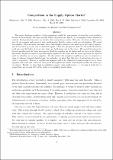| dc.contributor.author | Martinez-de-Albeniz, Victor | |
| dc.contributor.author | Simchi-Levi, David | |
| dc.date.accessioned | 2012-03-28T20:19:07Z | |
| dc.date.available | 2012-03-28T20:19:07Z | |
| dc.date.issued | 2009-09 | |
| dc.date.submitted | 2009-05 | |
| dc.identifier.issn | 0030-364X | |
| dc.identifier.issn | 1526-5463 | |
| dc.identifier.uri | http://hdl.handle.net/1721.1/69885 | |
| dc.description.abstract | This paper develops a multiattribute competition model for procurement of short life-cycle products. In such an environment, the buyer installs dedicated production capacity at the suppliers before demand is realized. Final production orders are decided after demand materializes. Of course, the buyer is reluctant to bear all the capacity and inventory risk, and thus signs flexible contracts with several suppliers. We model the suppliers' offers as option contracts, where each supplier charges a reservation price per unit of capacity and an execution price per unit of delivered supply. These two parameters illustrate the trade-off between total price and flexibility of a contract, which are both important to the buyer. We model the interaction between suppliers and the buyer as a game in which the suppliers are the leaders and the buyer is the follower. Specifically, suppliers compete to provide supply capacity to the buyer, and the buyer optimizes its expected profit by selecting one or more suppliers. We characterize the suppliers' equilibria in pure strategies for a class of customer demand distributions. In particular, we show that this type of interaction gives rise to cluster competition. That is, in equilibrium suppliers tend to be clustered in small groups of two or three suppliers each, such that within the same group all suppliers use similar technologies and offer the same type of contract. Finally, we show that in equilibrium, supply chain inefficiencies—i.e., the loss of profit due to competition—are at most 25% of the profit of a centralized supply chain. | en_US |
| dc.description.sponsorship | United States. Office of Naval Research (contract N00014-95-1-0232) | en_US |
| dc.description.sponsorship | United States. Office of Naval Research (contract N00014-01-1-0146) | en_US |
| dc.description.sponsorship | National Science Foundation (U.S.) (contract DMI-0085683) | en_US |
| dc.description.sponsorship | National Science Foundation (U.S.) (DMI-0245352) | en_US |
| dc.description.sponsorship | National Science Foundation (U.S.) (CMMI-0758069) | en_US |
| dc.description.sponsorship | Massachusetts Institute of Technology. Center for Digital Business | en_US |
| dc.description.sponsorship | University of Navarra. IESE Business School (CIIL International Center for Logistics Research) | en_US |
| dc.language.iso | en_US | |
| dc.publisher | Institute for Operations Research and the Management Sciences | en_US |
| dc.relation.isversionof | http://dx.doi.org/10.1287/opre.1090.0735 | en_US |
| dc.rights | Creative Commons Attribution-Noncommercial-Share Alike 3.0 | en_US |
| dc.rights.uri | http://creativecommons.org/licenses/by-nc-sa/3.0/ | en_US |
| dc.source | Simchi-Levi via Anne Graham | en_US |
| dc.title | Competition in the Supply Option Market | en_US |
| dc.type | Article | en_US |
| dc.identifier.citation | Martinez-de-Albeniz, V., and D. Simchi-Levi. “Competition in the Supply Option Market.” Operations Research 57.5 (2009): 1082–1097. | en_US |
| dc.contributor.department | Massachusetts Institute of Technology. Operations Research Center | en_US |
| dc.contributor.approver | Simchi-Levi, David | |
| dc.contributor.mitauthor | Simchi-Levi, David | |
| dc.relation.journal | Operations Research | en_US |
| dc.eprint.version | Author's final manuscript | en_US |
| dc.type.uri | http://purl.org/eprint/type/JournalArticle | en_US |
| eprint.status | http://purl.org/eprint/status/PeerReviewed | en_US |
| dspace.orderedauthors | Martinez-de-Albeniz, V.; Simchi-Levi, D. | en |
| dc.identifier.orcid | https://orcid.org/0000-0002-4650-1519 | |
| mit.license | OPEN_ACCESS_POLICY | en_US |
| mit.metadata.status | Complete | |
